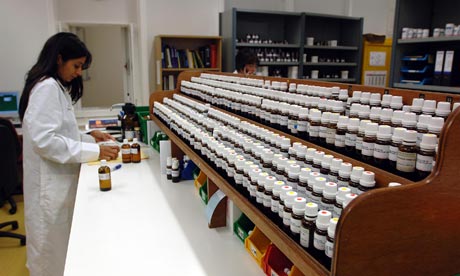
Patients are at risk of being misled over the benefits of homeopathy by the government's decision to fund the remedies on the NHS, the country's most senior scientist warned today.
Sir John Beddington, the government's chief scientific adviser, said patients might believe homeopathic treatments could protect them against serious illnesses, or treat existing conditions, because GPs and hospitals are allowed to prescribe them on the NHS.
Tens of thousands of people are given homeopathic pills and other preparations by their GPs or at Britain's four homeopathic hospitals, at an estimated cost to the NHS of between £4m and £10m a year. Most homeopathic remedies are diluted multiple times to the point that only water is left, while others are essentially sugar pills.
Professor Beddington said ministers agreed to fund homeopathy on the grounds of "public choice", despite there being "no real evidence" that the remedies work.
"I have made it completely clear that there is no scientific basis for homeopathy beyond the placebo effect and that there are serious concerns about its efficacy," Professor Beddington told the Commons science and technology committee today.
He went on to warn that government funding for homeopathy risked legitimising unproven treatments and that patients could harm their health by choosing these over conventional vaccines and medicines.
"There is a danger that the public will think that there is real efficacy for some serious conditions and I believe we have to work on that and make clear that this is not correct," he told the committee.
In June, doctors at the British Medical Association's annual conference voted three to one to halt NHS funding for homeopathic hospitals and ban homeopathic remedies on prescription. A report by the Commons science and technology committee published in February also called for an end to NHS funding for homeopathic medicine.
Professor Beddington cited the case of a man who caught malaria after being advised to take a homeopathic preparation to protect against the disease.
Graham Stringer, a member of the science and technology committee, challenged the government's claim that its policies are based on sound evidence.
"Giving people water or tablets with nothing in them except sugar is in itself harmless, but there is real evidence that homeopaths are prescribing these so-called medicines for things like malaria and other diseases, and in that sense this is very serious. In high street chemists, like Boots, these products are next to serious medicines," Stringer said.
"If the government is paying out millions for homeopathy, people will think there's something in it. The only reason for funding them is that ministers in the last government and in this government have not had the bottle to stop the funding."
This article was amended on 27 October 2010. The caption gave the hospital's former title, the Royal London Homeopathic Hospital. This has been corrected.

